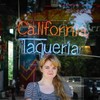WACA are protesting the bipartisan support of offshore and onshore detention centres. Image via Twitter
Advertisement
I'm at Parliament with the rest of the group. We've got about 15 of us standing in the water feature out the front holding up signs, and then we've got the banner just under the coat of arms that says "Close the Bloody Camps Now, Justice For Refugees."It seems like security at Parliament is kind of rubbish. Did you guys climb on the roof to erect that banner?
Well, I'm not part of the climbing team and, in general, we don't like talking about how we operate, but essentially you can just walk up the lawn to the front of Parliament. There are joggers there every morning, and it is the hearth of democracy—people are supposed to be able to go there. That's how we got into the gallery yesterday. It's open to all citizens. Just took a bit of planning, it wasn't the most difficult thing to do.How have you been treated by security today?
It hasn't been too bad, they were pretty upset obviously when they realised we were the same people [as yesterday]. That obviously frustrated them. But we're here to present our message and that's what's really important, it's not about the individuals, it's about how people are being treated in the offshore and onshore detention centres. That's way more horrible than anything they could do to us.
Advertisement
Well, I think it definitely highlights how these policies have come into being in the first place. They're being passed and supported by MPs in the government with bipartisan support. They do support these policies and that's why we're here, to say that that's not okay. And that a lot of the public is against it. We've seen a huge increase in people coming out to rallies and speaking out against the treatment of people seeking asylum by the Australian government, and I think it is really important to highlight that, even now when we're being very clear with what the demands are—we want the camps closed—we're still having MPs publicly ridiculing us. I think it shows how out of touch they are with the Australian public and just humanity in general.So you were expecting this response from both major parties—you think it actually supports your argument.
Yes, exactly.Political leaders on both sides have called the protest undemocratic. What do you say to them?
I think protest is a very important part of democracy. The government is put in place in a democracy to represent the people, and it's clearly not doing that at the moment—in the way it is treating refugees and also in a number of other cases. And so I think protest is a really important way to enter into a dialogue with a representative, and state that we are the people that they represent. I also feel like we've done absolutely everything else that we possibly could in order to enter into discussion. We've gone to rallies, we've signed petitions, we've called our MPs, we've done absolutely everything else possible. So now we're here interrupting Question Time, and standing in water features—because no one is listening.
Advertisement
Exactly, and we are all of us a group of experienced activists and organisers. We know that this is not the only method, we know that this is a way to send a strong message. We can see from the media attention that these kind of actions, pulled off correctly, can be really powerful. Obviously it's not the only way but it is a really important strategy that, when needed, should really be used. Particularly when we have this so-called house of democracy that's taking Australia in a completely different direction to where most people want to be going.Which politicians have come out in support of you guys?
We did have the Greens come out yesterday, Richard Di Natale, and we just had Lee Rhiannon here. It's mainly been media and not so much politicians though who are actually coming out to talk to us.Many young progressives are questioning whether this makes them look ridiculous, or unreasonable. Do protests like these tarnish the reputation of young people and activists?
Yeah it's pretty interesting—I've seen a lot of that as well, people labelling us "young people," but we actually have a huge range of age. People from all walks of life have participated over the past two days. So there's a huge age range of people involved. I would also say that there's nothing ridiculous about this protest. It sends a strong message and we've done what we can in order to hold the space. It's been really powerful, everyone around the country has been talking about it, we got international attention yesterday and I think we will again today as well. That shows it's a lot more powerful than just attending a rally. Obviously everyone's got their own opinion and that's totally fine, but I think everybody who was involved today looks really somber and composed and I'm really impressed with everybody.This is the last week of Parliament. What are your hopes for next year?
Well the reason we chose to do the action this week was we wanted to be very clear that this is the message all of the politicians go home with and that they go home over their Christmas break and think about what they're doing, what's going on, and how people feel about it. And as I've already said before our demand has always been that we evacuate everyone offshore, Christmas Island, Nauru, Manus Island, process people correctly and give justice to refugees who are being detained by the Australian state. And that needs to happen immediately.Follow Kat on Twitter
